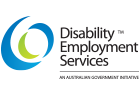Disability Employment Services (DES) can be accessed by those who have disability, injury, illness or mental health conditions.
Disability is an umbrella term for any or all of the following components, all of which may also be influenced by environmental and personal factors. There are visible and invisible forms of disability. A person is considered to have a disability if they have a limitation, restriction or impairment. This includes:
Sensory
- loss of sight (not corrected by glasses or contact lenses)
- loss of hearing where communication is restricted, or an aid to assist with, or substitute for hearing is used
- speech difficulties
Intellectual
- difficulty learning or understanding
Psychosocial
- mental health conditions or conditions requiring help or supervision (e.g. anxiety disorders, mood disorders and more)
- memory problems or periods of confusion that restrict everyday activities
- social or behavioural difficulties
Head injury, stroke or acquired brain injury
- head injury, stroke or other acquired brain injury, with long-term effects
Physical
- asthma or breathing difficulties
- blackouts, seizures or loss of consciousness (e.g. epilepsy)
- chronic or recurrent pain or discomfort that restricts everyday activities
- partial use of arms/fingers or feet/legs
- difficulty gripping or holding things
- restriction doing physical activities or work
- disfigurement or deformity
Other
- receiving treatment or medication for any other long-term conditions or ailments and still restricted in everyday activities (e.g. asthma)
- any other long-term conditions resulting in a restriction in everyday activities
No matter your barrier to finding working, our Disability Employment Services are here to help with a tailored plan for each and every client, designed to find you the right job for you. Not sure if you are eligible? Check out our information on eligibility here.



